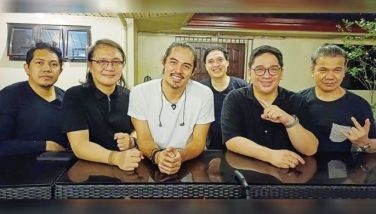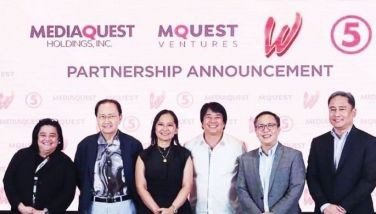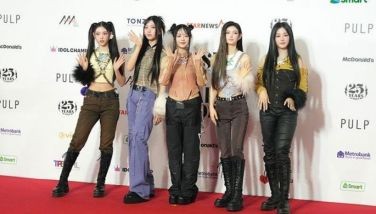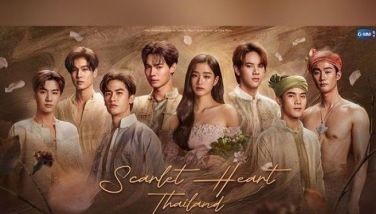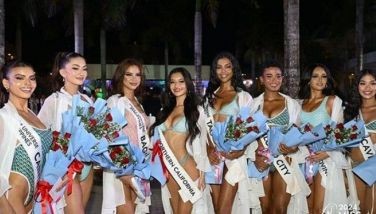Jazz in time with Bobby Caldwell
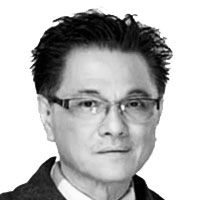
October 10, 2002 | 12:00am
 Mention the name Bobby Caldwell and what immediately comes to mind are his immortal songs such as What You Won’t Do For Love, Real Thing, Heart of Mine, Don’t Ask My Neighbor, Next Time I Fall and Who Are You? which Caldwell will be singing at the Bobby Caldwell and Phil Perry Live in Manila concert on Oct. 19, Saturday, 8 p.m. at the Araneta Coliseum, produced by 105.1 FM Crossover Manila.
Mention the name Bobby Caldwell and what immediately comes to mind are his immortal songs such as What You Won’t Do For Love, Real Thing, Heart of Mine, Don’t Ask My Neighbor, Next Time I Fall and Who Are You? which Caldwell will be singing at the Bobby Caldwell and Phil Perry Live in Manila concert on Oct. 19, Saturday, 8 p.m. at the Araneta Coliseum, produced by 105.1 FM Crossover Manila.
It’s a rare jazz event, no doubt, with the two jazz greats performing together for the first time in one show, albeit separately.
Tracing a 20-year history acclaimed soul stylist to sought-after pop/R&B songwriter, Caldwell is truly one of the music industry’s most celebrated singers/songwriters.
As a singer, he has a successful career with numerous solo releases which have earned him many accolades. His songwriting skills have earned hits not only for himself but also for well-known artists like Chicago, Boz Scaggs, Peter Cetera, Amy Grant, Neil Diamond and Al Jarreau. Caldwell timeless classic What You Won’t Do For Love has been recorded and sampled by more than 70 artists. A sample of Caldwell’s song, Open Your Eyes I, appeared in the Grammy-nominated platinum rap hit The Light by Common. Caldwell’s songs and samples have contributed to over 40 million sales and artists as diverse as Tupac Shakur, Michael Bolton, Roberta Flack, Go West, Vanessa Williams and Notorious B.I.G. have all paid tribute to the blue-eyed singer in the slouch hat.
Caldwell’s live performances are always electrifying. Drawing from his vast repertoire of rousing R&B, intimate smooth jazz stylings and big-band songs, Caldwell possesses the ability to entertain at any venue, for fans of all ages. In Japan and throughout Asia, he enjoys a feverish popularity, selling out shows and achieving gold and platinum status for his releases in those countries. In addition to heavy touring, Caldwell starred as Frank Sinatra in the David Cassidy/Don Reo theatrical production, The Rat Pack Is Back, in Las Vegas. Caldwell received rave reviews for his performance both from industry critics and from his loyal fans.
Caldwell’s latest release is the second in the Anthology Series and is entitled Time & Again. Encompassing his hits that were made popular by other artists as well as two brand-new songs, Time & Again is a strong album that will prove to be an excellent addition to Caldwell’s discography. Caldwell will continued his work on another album of all-new, originally-written smooth jazz/urban material, that was released recently in early 2002.
Born in Manhattan and raised in Memphis and Miami, Caldwell came from a show business family. His mother and father both sang and were the hosts of one of the first musical variety programs on television, Suppertime. Caldwell grew up listening to show tunes, the music of Frank Sinatra and Nat King Cole, as well as songs that featured the arrangements of Billy May, Don Costa and Nelson Riddle. These early influences are prevalent in Caldwell’s singing and songwriting.
Accompanied by Eliza Gotico, one of those behind the Big Dome concert, Funfare had the rare chance of interviewing Caldwell in Orange County, halfway between San Diego where he lives and Los Angeles where Eliza and I were billeted. The interview was conducted at the sprawling Ritz-Carlton Hotel which commands a sweeping view of the Pacific Ocean.
Excerpts:
Is it your first time to perform in Asia?
"Not in Asia but it’s my first visit to Manila. I’ve performed in other parts of Asia before."
What are your expectations on your Manila visit?
"That the friendliness and the warmth of the people would be like what I’ve experienced in my previous visits to Asia."
We your fans in Manila are looking forward to hearing you sing "live" your hits like Heart of Mine, Don’t Ask My Neighbor, Next Time I Fall and all the other Bobby Caldwell songs.
"We just so happen to be doing these songs."
And, of course, What You Won’t Do For Love. What inspired you to write that song?
"There’s a funny story that goes with that song. The album was complete without that song. The record company came to me and said, ‘You know, we don’t hear a hit on this record.’ And I said, ‘What am I gonna do? I thought I already had a pretty strong album.’ But, of course, to them I didn’t. So one evening, we started messing around with a progression of chords and it fell together into a rhythm track and then I started toying around with some lyrical ideas and vocals. By midnight, I had a vocal and a track. The next day, we put the horns on. Ten months later, What You Won’t do For Love was the No. 1 record in the country. In as far as what inspired it, probably a woman."
The song has a catchy intro. How did you come up with it?
"Oh, you mean the horns ... I remember sitting with an arranger who was going to arrange the horns on the synthesizer. I was playing for him the horn line that I wanted for the intro. The 24-track tape was rolling and I was taking down notes while I was singing. Then, we brought in some real horn-player ... another evolution of ideas ... and that was it."
To what do you attribute the success of the song?
"I haven’t figured that out until now. I hear different things from different people – you know, what they like about the song. It seems to be different for everybody. But I think the song was a hit because for four years before that, the disco was everywhere - it was overtime. And then came What You Won’t Do For Love, something contrary to what was happening and I think the timing helped the song a lot. Right song, right place, right time."
I understand there are 70 versions of the song recorded so far. Which version do you find the best?
"I can’t tell. There are so many versions coming out. I never know when a new one is coming out. They don’t have to tell me. They don’t have to ask my permission; they just have to pay the money."
Your parents were hosts of Suppertime during the early years of television. Was this a contributing factor to your varied musical interests?
"Oh, yeah. When I was growing up in New York, my parents were on television and in a lot of theater road tour. Our house was always filled with people from the theater, and with the music of Ella Fitzgerald, Frank Sinatra and some of the big bands. It was something that become infectious for me. I always told myself, ‘They seem to be having such a good time.’ You know, it was inevitable for me to end up in this business."
At what point in your life did you realize that you would be a singer/songwriter?
"When a girl first fell in love with me because I played the guitar. There and then, I made up my mind that I would be making music all my life."
What was the first song that you fell in love with?
"There was a group in the ’30s which had a song called Ruby Baby. That was for me the turning point. I was an avid radio listener and they played that song over and over again. I fell in love with that song. I was such a radio listener that when my folks put me to bed at night, they put a little flashlight on my radio and I listened on my head phone."
What kind of music did you listen to?
"Pop. I was born in 1951. Back then, there was only pop radio; there wasn’t R&B, pop-rock, alternative rock or Gospel music. There wasn’t any of them. There were only The Hot 100, including all the different kinds of music existing in one format. It wasn’t until much, much later that everything started to break up in different formats, different genres."
You played with Little Richards for two years. What was your guitar style then?
"My guitar style was whatever he wanted it to be. I was adjustable; I could adapt to any style. It was my first trip to Las Vegas. Everyone knows that Richards was wild but he treated us really good. I learned a lot from Richards. The guy was exposed to doing TV shows, stuff like that, and it was kind of a ground-breaking experience for me. I don’t think it’s something I want to do again, but it was a good experience. I was 17; it was my chance to go to California."
At 17, were you looking for a style that best fitted your talent?
"Not at all. I was just trying to be a consummate musician, playing the guitar, the piano and bass. It wasn’t until I was maybe 22 or 25 that I started a solo career as a songwriter. I was fascinated by Jimmy Hendrix, the Liverpool groups and other artists who came in from England. Later on, I became influenced by Motown and the Philadelphia sound. I started to discover that I could sing. All in all, they kind of fitted together – you know, a work in progress."
What did you like about the Motown sound of, say, Stevie Wonder?
"Well, he’s incredibly musical, for one. Incredible lyrics and, of course, his vocals. He’s constantly evolving as an artist. I like that. It’s the thing that wants you to keep listening to the record again, over and over."
You’ve done songs for Peter Cetera, Amy Grant, Al Jarreau, the Commodores and other artists. Do you choose the singers of your songs?
"I could tell you wonderful stories about all those people. They have their own unique talents to offer. Each one of them is different from the others; each one has a distinct vocal sound, a distinct style. One of the most important things an artist can have is an identifiable voice."
You recorded a jazz album with a 60-piece orchestra made up of Frank Sinatra and Tony Bennett band members. Was it a throwback to the music of your growing-up years?
"Yes, it was – very much! I don’t think a day went by in my house when we weren’t hearing Sinatra on the record-player. All day, all night, 24 hours a day it was always Sinatra. I am speaking for a lot of singers I know, who are stars in their right, but I don’t think there is one of them who wasn’t influenced in some way by Sinatra. So the orchestral albums carried songs which I’ve stocked in my head for 35 years."
What are the three Sinatra songs that you like most?
"Wow, it’s hard to choose just three. But I would have to say, One Day In , Day Out; two, Under My Skin; and, three, I’ll Be Around (from the Come Rain, Come Shine album)."
What would you consider the song of your life, the one song that speaks of the essence of Bobby Caldwell?
"Whew! It’s hard to choose just one because I have several favorite songs, like Stuck on You, Don’t Lead Me On, Show Me (by The Survivors) and April Moon (by one of the big band albums)."
BrandSpace Articles
<
>
- Latest
- Trending
Trending
Latest
Trending
Latest
Recommended















